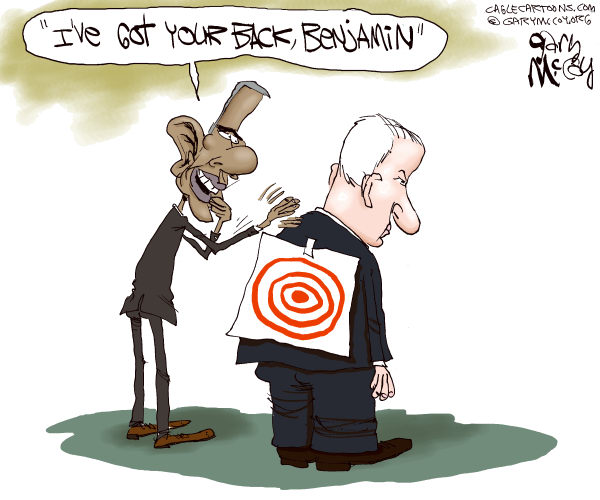Post by Dixie on Sept 17, 2015 10:55:06 GMT -6
You Can Literally Count the Number of U.S.-Trained Syrians Fighting ISIS on One Hand
Lawmakers slammed the U.S. plan to defeat the Islamic State group in a heated Capitol Hill hearing.
By Paul D. Shinkman | Sept. 16, 2015 | 1:40 p.m. EDT

Sens. John McCain, R-Ariz. and Jack Reed, D-R.I. question Gen. Lloyd Austin III during a Senate Armed Services Committee hearing on Wednesday.
As if the U.S.-led campaign against the Islamic State group in Iraq and Syria didn't have enough problems already, two top officials overseeing the conflict faced a veritable battering on Capitol Hill Tuesday as they struggled to explain how any aspect of the plan has proved successful.
"I have never seen a hearing that is as divorced from the insight of every outside expert," Sen. John McCain, chairman of the Senate Armed Services Committee, said in response to initial testimony from Defense Undersecretary for Policy Christine Wormuth and Army Gen. Lloyd Austin, head of the U.S. headquarters overseeing the war against the Islamic State group.
The pair tried to explain the limited successes the campaign has seen thus far, namely its air war and focus on equipping and training forces on the ground.
But the results of that latter component were met with at least one exaggerated chortle from the dais, particularly when Austin explained that an effort to train Syrians that was originally expected to produce 5,400 trained fighters a year has so far only resulted in "four or five" who still remain on the ground and active in combat.
"It's a small number," said Austin, who oversees U.S. Central Command. "The [New Syrian Force] program has gotten off to a slow start."
Wormuth said as many as 100 more trainees are in the program and may be deployed to Syria this year. But even that accounting was met with limited praise from members of the committee.
"So we're counting on our fingers and toes," Sen. Claire McCaskill retorted. The Missouri Democrat expressed concern that U.S. military leaders, trained to respond to orders with sharp salutes and their best efforts, may not be able to admit to war planners in the White House and elsewhere that President Barack Obama's restrictions on defeating the insurgent network have produced a hopeless strategy.
"I'm just worried this is one of those instances where the good news about our military is dominating … and the practical realities of this strategy aren't being fully embraced," McCaskill said. "If we end up at the end of the year bragging about the differences between 100 and 120, the strategy isn't working."
Wormuth confirmed the Pentagon is considering a shift in its training plan to create smaller units of fighters who would embed with experienced moderate forces in Syria, rather than operate on their own. That option was first reported by Foreign Policy magazine.
Adding further complication to the situation on the ground are recent reports that Russia, the traditional patron of Syrian President Bashar Assad's regime, has stepped up its direct military support in Syria and appears to have established its own forward operating air base at the port city of Latakia. Russia already maintains a military facility at Tartus, another coastal town.
"We are witnessing a buildup of forces in Syria by Russia," Austin said. "They have been there all along, but they are increasing their footprint."
"They want to focus on helping to counter [the Islamic State group], as I understand it. That's left to be seen. As you know, Russia's not very transparent, so we don't really know what their true intentions are," he said.
Assad's military "still has considerable strength" due to its Russian and Iranian backing, Wormuth said later, adding "it's still the most powerful military force on the ground."
"The assessment right now is the regime is not in imminent danger of falling," she said.
Defense Secretary Ash Carter has had no formal interactions with his Russian counterpart since taking office earlier this year, due to Russia's actions in Ukraine, Pentagon spokesman Peter Cook said Monday. However, Secretary of State John Kerry announced Tuesday that Russia had proposed re-establishing military-to-military relations.
Austin and Wormuth declined to comment specifically on recent reports that top military commanders have skewed intelligence about the Islamic State group in order to make the extremist organization appear weaker, in line with the preference of White House officials.
Austin said he had never taken part in fudging intelligence, and noted that combat commands such as his do not directly brief the president, but rather funnel information through intelligence headquarters such as the Defense Intelligence Agency, which in turn briefs Director of National Intelligence James Clapper.
Source Link
Lawmakers slammed the U.S. plan to defeat the Islamic State group in a heated Capitol Hill hearing.
By Paul D. Shinkman | Sept. 16, 2015 | 1:40 p.m. EDT

Sens. John McCain, R-Ariz. and Jack Reed, D-R.I. question Gen. Lloyd Austin III during a Senate Armed Services Committee hearing on Wednesday.
As if the U.S.-led campaign against the Islamic State group in Iraq and Syria didn't have enough problems already, two top officials overseeing the conflict faced a veritable battering on Capitol Hill Tuesday as they struggled to explain how any aspect of the plan has proved successful.
"I have never seen a hearing that is as divorced from the insight of every outside expert," Sen. John McCain, chairman of the Senate Armed Services Committee, said in response to initial testimony from Defense Undersecretary for Policy Christine Wormuth and Army Gen. Lloyd Austin, head of the U.S. headquarters overseeing the war against the Islamic State group.
The pair tried to explain the limited successes the campaign has seen thus far, namely its air war and focus on equipping and training forces on the ground.
But the results of that latter component were met with at least one exaggerated chortle from the dais, particularly when Austin explained that an effort to train Syrians that was originally expected to produce 5,400 trained fighters a year has so far only resulted in "four or five" who still remain on the ground and active in combat.
"It's a small number," said Austin, who oversees U.S. Central Command. "The [New Syrian Force] program has gotten off to a slow start."
Wormuth said as many as 100 more trainees are in the program and may be deployed to Syria this year. But even that accounting was met with limited praise from members of the committee.
"So we're counting on our fingers and toes," Sen. Claire McCaskill retorted. The Missouri Democrat expressed concern that U.S. military leaders, trained to respond to orders with sharp salutes and their best efforts, may not be able to admit to war planners in the White House and elsewhere that President Barack Obama's restrictions on defeating the insurgent network have produced a hopeless strategy.
"I'm just worried this is one of those instances where the good news about our military is dominating … and the practical realities of this strategy aren't being fully embraced," McCaskill said. "If we end up at the end of the year bragging about the differences between 100 and 120, the strategy isn't working."
Wormuth confirmed the Pentagon is considering a shift in its training plan to create smaller units of fighters who would embed with experienced moderate forces in Syria, rather than operate on their own. That option was first reported by Foreign Policy magazine.
Adding further complication to the situation on the ground are recent reports that Russia, the traditional patron of Syrian President Bashar Assad's regime, has stepped up its direct military support in Syria and appears to have established its own forward operating air base at the port city of Latakia. Russia already maintains a military facility at Tartus, another coastal town.
"We are witnessing a buildup of forces in Syria by Russia," Austin said. "They have been there all along, but they are increasing their footprint."
"They want to focus on helping to counter [the Islamic State group], as I understand it. That's left to be seen. As you know, Russia's not very transparent, so we don't really know what their true intentions are," he said.
Assad's military "still has considerable strength" due to its Russian and Iranian backing, Wormuth said later, adding "it's still the most powerful military force on the ground."
"The assessment right now is the regime is not in imminent danger of falling," she said.
Defense Secretary Ash Carter has had no formal interactions with his Russian counterpart since taking office earlier this year, due to Russia's actions in Ukraine, Pentagon spokesman Peter Cook said Monday. However, Secretary of State John Kerry announced Tuesday that Russia had proposed re-establishing military-to-military relations.
Austin and Wormuth declined to comment specifically on recent reports that top military commanders have skewed intelligence about the Islamic State group in order to make the extremist organization appear weaker, in line with the preference of White House officials.
Austin said he had never taken part in fudging intelligence, and noted that combat commands such as his do not directly brief the president, but rather funnel information through intelligence headquarters such as the Defense Intelligence Agency, which in turn briefs Director of National Intelligence James Clapper.
Source Link


